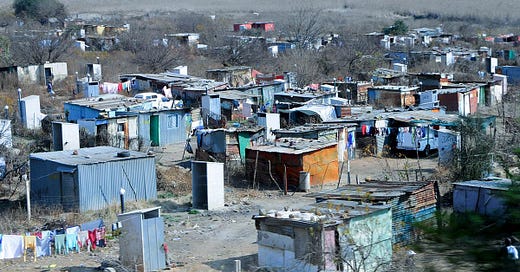This will be a very short blog post, written in one breath, as it were. I want to push back against one of the sillier claims of the left, which is that the United States, or the developed world, is dependent upon poverty in Africa, or that the poverty of Africa is due to present day exploitation by the developed world. I have often heard this in person, and it exists as a background assumption even in those who take a different view of whether or not this is a necessary sacrifice to take. In this view, the wealth of nations is dependent upon it being taken from somewhere. America will always need a supply of cheap labor to be wealthy. I find this so cretinous that it is difficult for me to restrain my feelings to argue against it, but I shall do my best. The contribution of the developing world to anything is minute – they are poor precisely because they do not make anything, not because what they make is taken. Those countries with large exports of natural resources – like Botswana, or South Africa – are the richest countries in Africa.
The first thing to note is that Africa simply does not export much of value to America or the developed world. The total value of exports from Africa to America per year is $17 billion a year. To put in context, that is about half of what Medicare spends per year on kidney dialysis alone. The total welfare loss of that trade not happening would be far smaller than the raw volume of trade – any exports we lose access to can be done in the United States, at some lower level of efficiency. The aid that we give to Africa – a few billion a year – likely totally outweighs the welfare gain from trade. If Africa winked out of existence, from an economic point of view, we would scarcely notice. Including other countries doesn’t help. $53 billion is exported to China, $19 billion to India – absolute fiddlesticks. Total trade, including trade between sub-saharan African nations, is only $310 billion a year. Africa is poor because they make basically nothing at all, not because what they do make it taken.
Second, there is no reason whatsoever to think that production – which is ultimately the source of all wealth – would be aided by people being poorer. Wages reflect the next best option. Even if firms have market power, wages largely reflect productivity. The most you could ever exploit someone for is the difference between their production for your company, and the best wage they can get elsewhere. The western world is not a monolith – the only way for someone to exploit their workers would be if other companies are totally unable to produce there. If African workers were much more productive per dollar than other workers, as the exploitation story implies, firms could profit by moving their operations to Africa. That they do not indicates that marginal product divided by marginal cost is in fact the same, or close to it, across all countries.
Poverty in Africa cannot be solved with wishful thinking, or moral fairy tales. Their problems run far deeper than a few malign foreigners. We should not fear the foreign multinational, or the sweatshop. I *wish* that there were more sweatshops in Africa. As it turns out, the only thing worse than having your labor be exploited is not being exploited at all.



The West might take a lot of Africa's cognitive elites for itself, but criticizing this would in large part assume that smart people are the properties of their birth/home countries, which I strongly disagree with.
Man, there is so much straw-manning here. First, I am not myself well-read on uneven exchange concept but it is crucial to that view of "underdevelopment" or "dependency" theories. Second, I think people usually complain that the West developed by ways that are not readily available for other countries (degrees of protectionism, exploitation of cheap resources and labor during colonization (basically military conquests) and etc.), the real problem is that the West refuses mostly to acknowledge this in discussing the development in africa and more importantly, some advantages enjoyed by the West today (immaterial institutions like law or market or democracy or physical ones like buildings, factories, sanitation, internet (at the beginning)) took years and arrangements that spilled over socially like in education and health care and their connection to existing private sector and proper endogenous governance institutions. Usually, Africa is forced on fast-pace development that ignores the formation of human capital and also proper product development (it takes 3 years for a market to adapt a practice 10 years for government project and 25 years for academia to produce) (also read the book about how regionalism rules not globalism). Third specifically, a big problem with US is its stringent refusal for global regulations that is consistent because of power politics (from war on terror to wto trade liberalization to climate change to the pandemics to social media networks) and it plays out internally in US in form of libertarianism (sometimes it requires to be authoritarian to achieve en masse liberty). Fourth, US kills cultures under liberal tenets and killing cultures distort realities of people without subsquent fast material improvement (read politics of the governed by Chatterjee)